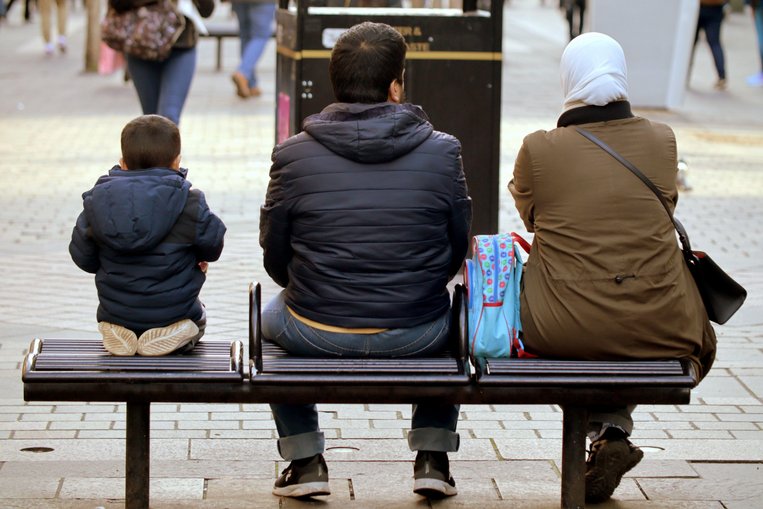To solve the care crisis, re-imagine “family”
Immigration Minister Robert Jenrick thinks we should have more kids to solve the care crisis. But the solution lies outside the traditional family box.
Robert Jenrick thinks you should have more children. That’s what the current Minister for Immigration told an event at Conservative Party conference last week and later reiterated to the Guardian. Why does he care about procreation? Because he wants to slash visas for migrant care workers and replace the care that they provide with the (presumably unpaid or underpaid) labour of loved ones.
There are two reasons why this is a flawed strategy for tackling our ‘care crisis’, which are fairly obvious to everyone - except, presumably, Jenrick.
First, the idea of having any kids - let alone lots - isn’t tremendously tempting in a cost-of-living crisis. According to Britain Thinks and the TUC, 32% of parents of pre-school age children spend over a third of their wages on childcare. In the context of high food, housing and energy prices, alongside wage stagnation, it’s not hard to understand why the UK birth rate is its lowest since 2002.
Second, it can’t have escaped Jenrick’s notice that the planet is, effectively, on fire. While the current government gleefully tears up our climate commitments and approves oil field drilling, research has found millennials and younger generations are deterred from having children thanks to impending ecological disaster.
But Jenrick is correct that family members are a crucial part of our care infrastructure. There are around 1.6 million social care workers in the UK today, but approximately 10 million family members or friends provide ‘informal’ unpaid care. And that’s not solely due to underfunding of social care, though people often assume it is. While family carers desperately need more paid support, having this in place wouldn’t remove their role. Even with paid care, family members remain on call because of the unpredictability of illness and impairment.
“Jenrick probably doesn’t mean ‘people should have more kids’, he probably means ‘women should have more kids’.”
Many people who need care also refuse outside support or live in cultural contexts in which accepting outside help is stigmatised. Although research on this is limited, we do know that in the UK, Asian and Black carers are more likely to provide longer hours of care than their white counterparts. Another study found that elderly people had been lying to social services to avoid being tarred as needing state help, leading their neighbours to step in. Even when it’s accepted, family members must still spend time advocating for their loved ones to ensure they receive quality care because of mental or physical impairments that impede communication.
This doesn’t reduce with improved state services - one of the carers I interviewed for my book, ‘Who Cares’, lives in Norway with ample state support, but she impressed upon me that ‘you have to have a first class degree’ to navigate the bureaucracy. This shuts out many people with cultural or linguistic barriers from accessing support even when it’s available. And of course, sometimes we will want to be with our loved ones, even if alternatives are available. So perhaps Jenrick is correct? If family members (often adult children) are a vital part of our care infrastructure, maybe we should be popping kids out like rabbits?
That’s one option. But only if we’re cool with entrenching gender inequality. Because Jenrick probably doesn’t mean ‘people should have more kids’, he probably means ‘women should have more kids’. It’s people with wombs who’ll be doing the gestational and postnatal work to create his imagined phalanx of unpaid carers. And I bet he’s also not imagining children in general performing more care, but daughters. Today, there are at least 1 million more women providing unpaid care for sick or impaired loved ones than men, and even when men do perform care, research finds they tend to opt for less intensive and disruptive roles than women take on. He may not have said it explicitly, but thanks to the patriarchal structures that make up our society, Jenrick is imagining a world in which people have daughters in order to assign them a life of unchosen, unpaid care.
For those of us who prefer a fair future to a regurgitated past, it poses an interesting question. How do we accept that family members are key to care, while refusing the constraints of patriarchy? How do we manifest supportive care networks if not via procreation?
“Instead of biology and procreation dictating our caring arrangements, we can cultivate ‘families-of-choice’, constructing new kinds of collective care which don’t constrain us to the bonds of biology nor women’s reproductive.”
There is an answer, and it’s an exciting one. The useful kernel hiding within Jenrick’s anti-migrant, anti-state pronouncement is this: family is the culturally accepted site of obligation. We feel (theoretically) obligated to provide care to our parents. And if we don’t have kids, we lack a vital source of built-in care. Jenrick can’t think outside the traditional family box for his solution, but we can.
Family doesn’t have to be the site of obligation. Instead of biology and procreation dictating our caring arrangements, we can cultivate ‘families-of-choice’, constructing new kinds of collective care which don’t constrain us to the bonds of biology nor women’s reproductive capacities. This is the only answer to the care crisis which both recognises the inextricable role of loved ones while refusing to relegate women to Gilead 2.0.
From the medieval women who set up shared housing systems across Europe, to the LGBTQ+ communities that pioneered new arrangements during the AIDS pandemic, history abounds with inspiration. And today, pioneering co-housing schemes, support circles and neighbourhood mutual aid networks are pointing the way.
In these spaces, care usually confined to the biological family can be expanded and reimagined. Women don’t have to birth a football team or be shamed for being child-free. And there can be more hands on deck than in the traditional family - instead of one or two exhausted relatives, there is a community of loved ones, creating rotas, navigating bureaucracies, making meals, supporting hobbies and so on. Care does not become easy in this context, but it can be eased by distributing it more broadly and imaginatively. This practice is one I call ‘kinning’ - to create kinship with people. By doing so, we can weave new textures of care into our lives, for the everyday, and for the someday, too, when we will need it most.
Emily Kenway is a writer, researcher and former carer. Her second book, 'Who Cares: the Hidden Crisis of Caregiving and How We Solve It' (Hachette, 2023) was a finalist for the Orwell Prize for Political Writing 2023.
The Lead is now on Substack.
Become a Member, and get our most groundbreaking content first. Become a Founder, and join the newsroom’s internal conversation - meet the writers, the editors and more.





